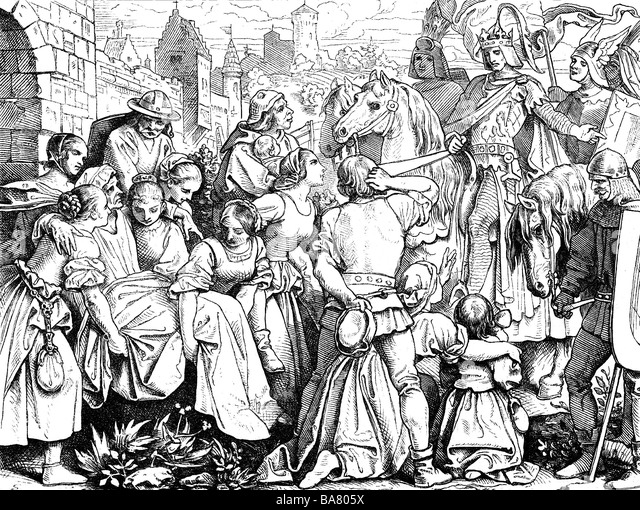Fredrick the One-eyed, the most powerful man in Henry's camp
Upon her husband's death Matilda and Henry made a quick exit from Utrecht and returned towards the core of the Holy Roman Empire. There she rallied support for her son against any possible challengers. Her nephew, Fredrick the One-Eyed, Duke of Swabia, lent his not insubstantial support to her. This was no doubt because he was, at the moment, heir to young Henry's titles.
That is, if one recognized Henry VI's titles at all. Some forces inside the Empire had opposed Henry V, and still sought to supplant him even after he had died. These men saw a golden opportunity in the younger Henry. He was young, uncrowned, and seemed destined to be dominated by his foreign mother. She could not count on any help from her father. England and Normandy were far away and foreign forces would not have raised Henry's stature as Emperor. And in any event both the King of France and the Count of Flanders were eager to disrupt any communication or travel between The Holy Roman Empire and the Norman Dominions. Both King and Count feared the possibility of encirclement should Henry VI gain too many crowns. So Matilda and her son would be on their own in any fight for the Imperial Crown.
Who did array themselves in opposition to Henry VI's rise to power and why did they do it? Some saw clearly his mother's influence and were opposed to the idea of a women, a
foreign women, taking the reigns of the empire for what was sure to be a long minority period for the Emperor. Others feared the influence of his cousin Fredrick. Fredrick's house, Hohenstaufen, was not very popular amongst the German nobility or clergy. Many thought Fredrick would prove the real power behind the throne, or even take it himself should Henry die young. That would simply have been unacceptable to some.
One of those stridently hoping for an alternative was Archbishop Adalbert of Mainz. Adalbert had once been an ally of Henry V but had turned on the late Emperor due to a combination of personal differences, theology, and a greed for land. Adalbert had raised German princes in rebellion while Henry V was in Italy and held considerable sway amongst the German clergy. He now saw an opportunity to gain a final victory over his enemy by denying his son the crown. Adalbert assumed, correctly, that Pope Honorius II would not prove a steadfast opponent towards such a move. Honorius was displeased with how slowly the Concordat of Worms was being implemented and would not have opposed a new dynasty more malleable to the papacy's demands. So Adalbert set out to finds candidate to oppose Henry VI's claim to the Imperial throne.
Lothair, Duke of Saxony. Perhaps the greatest threat to young Henry
He found one in Lothair, Duke of Saxony. Lothair had joined the future Henry V's rebellion against Henry IV and thus been awarded with his title when Henry V had risen to power. But like Adalbert he had then turned on Henry V, even wresting effective control of Saxony away from the Emperor for a time. Lothair had opportunistically defected back to Henry's side before the latter's death, but still was not fully behind the Salian Dynasty. In particular he feuded with Fredrick the One-eyed. This obviously made him palatable to those opposed to Henry VI, as did the fact that he had no direct heirs. Lothair also had a general lack of awareness about church matters that made pliable to the clergy, adding to his appeal. So as the nobles of the realm gathered in Speyer to bury Henry V, two contenders had emerged for the crown.
Matilda has been criticized by some chroniclers for being "haughty" and not doing enough to gain noble support for her son's bid. These accounts claim that she operated on the assumption that her son would immediately be acclaimed Emperor and did nothing to stop opposition from emerging. This could be true, or it could simply be that writers from the Middle Ages had issues with powerful women. Either way Fredrick was not idle. For all his unpopularity in some circles the Duke of Swabia was still a powerful man, and a rich one who had money to spread around. Money always has the potential to effect pivotal moments in history, the squabble over Henry V's succession was no exception. Fredrick also had the initiative to send messengers to drag Henry V's army in Utrecht back towards the interior. The army had essentially been milling around and slowly dispersing, so Fredrick's quick thinking kept a major force on the side of the Salians.
While Fredrick's machinations certainly helped young Henry's cause so to did the young boy's very presence in Speyer. Henry had inherited a string stature from both his father's and mother's sides, and his apparent good health helped calm fears about Fredrick rising to power. In addition he, via his mother, brought his father's imperial regalia, bringing powerful sense of legitimacy to his cause. Finally there was the simple fact that he was the Emperor's son. Since the Salian Dynasty had come to power the Imperial elections had been rubber stamps for hereditary monarchy, and Henry's presence increased pressure for the nobles to revert to form.
Meanwhile Adalbert's plotting in favor of Lothair was coming up short. Lothair had no connection to the longstanding Salian Dynasty, and Adalbert's pleas could do little. The Bishop's argument that Hereditary monarchy was bad for the power of the nobles would have rung more true had the prospective new Emperor not been 3. Many reasoned that if they could keep Fredrick away from the boy his only influence would be Matilda. While they distrusted the foreign Empress she also held no vested interests in the Empire, potentially making her a good neutral arbitrator. Adalbert found himself stymied at nearly every turn.
The beleaguered Archbishop was forced to watch as the nobles united behind Henry with varying degrees of enthusiasm. None were less enthusiastic then Lothair himself, who reluctantly submitted to Henry's rule rather then stand alone. On August 17, 1125 Henry VI was crowned King of the Romans in Aachen, with his mother Empress Matilda, just 23 years old herself, as regent. But he was not yet Holy Roman Emperor.
For that his mother needed to convince the Pope to crown him.










